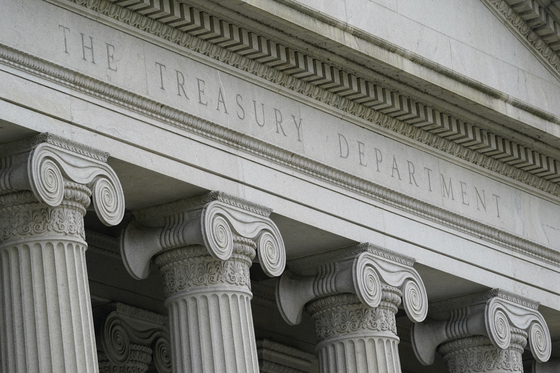U.S. Treasury begins exempting humanitarian aid from sanctions
![The Treasury Building in Washington [AP/YONHAP]](https://koreajoongangdaily.joins.com/data/photo/2022/12/21/e4b1df29-0ce0-4416-96a7-328c5aa9bfd8.jpg)
The Treasury Building in Washington [AP/YONHAP]
The U.S. Treasury Department announced Tuesday that it began authorizing exemptions for humanitarian aid from international sanctions, signaling the possible easing of restrictions on relief to North Korea.
According to the Treasury’s press release, the Office of Foreign Assets Control (OFAC) began issuing or amending general licenses to ease the delivery of humanitarian aid, authorizing the provision of humanitarian support across several international sanctions programs.
The department characterized OFAC’s actions as “historic steps” that “further enable the flow of legitimate humanitarian assistance supporting the basic human needs of vulnerable populations while continuing to deny resources to malicious actors” in accordance with United Nations Security Council Resolution (UNSCR) 2664.
The resolution, passed by the Security Council on Dec. 10, provides a “humanitarian carve-out” — a standing humanitarian exemption — to the asset freeze measures imposed by international sanctions regimes, according the United Nations press office.
In a separate statement, U.S. Secretary of State Antony Blinken said that the United States “is committed to protecting humanitarian access and removing impediments to the delivery of legitimate humanitarian aid around the world,” adding that the licenses issued by the Treasury “prevent abuse or diversion” and “make our sanctions clearer, stronger and more effective and streamlined.”
The Treasury’s exemption is expected to be applied to humanitarian aid for North Korea.
According to a 2019 Security Council report compiled by the United Nations Panel of Experts, successive Security Council sanctions have impeded the delivery of humanitarian aid to North Korea despite explicit clauses in resolutions intended to minimize sanctions-related hardship to ordinary citizens.
The report said that aid to North Koreans was often delayed by up to 10 months or completely blocked from 2018 to 2019, with a lengthy and complicated approval process cited by aid groups as hindering shipments.
As a result of sanctions, medical equipment that pose little risk to international security — such as needles, syringes and wheelchairs — have been included in 59 broad prohibited categories and needed to be cleared before being sent to the North, according to an NK News article written by researchers Jessup Jong and Kee B. Park.
BY MICHAEL LEE [lee.junhyuk@joongang.co.kr]




















